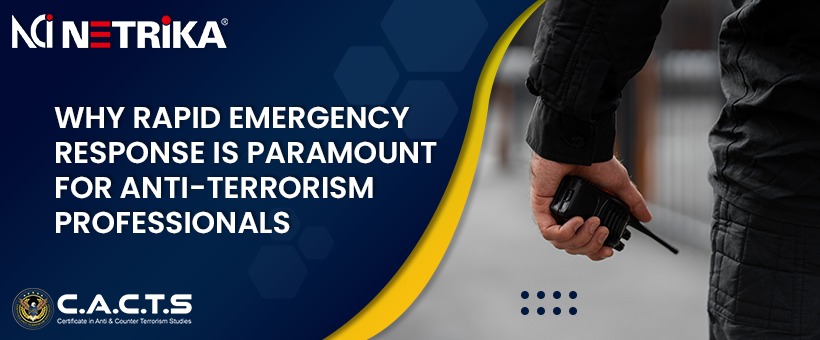News & Events
Why Rapid Emergency Response Is Paramount for Anti-Terrorism Professionals?
- January 23, 2024
- Posted by: marketing@netrika.com
- Category: Blogs

Rapid emergency response is crucial to counter the dynamic and unpredictable nature of terrorist activities. It helps specialists with counter terrorism certification to effectively and timely address terrorism-related acts, implement response measures to minimize casualties, maintain public safety, and protect infrastructure.
Here are some of the most crucial reasons why rapid emergency response is vital to certified anti terrorism specialists in the five-step cycle of preparedness, mitigation, response, recovery, and evaluation-
Intervention that saves lives: Anti terrorism training courses incorporate the required skills and knowledge in specialists to implement life-saving interventions during a terrorist incident and its aftermath. These interventions may include quick evacuation, prompt medical assistance, protocol-defined first aid, and relief aid distribution.
Prevention of Threats: A well-structured and swift emergency response in the aftermath of a terrorist attack enables certified anti terrorist specialists to mitigate the immediate looming threats which in turn prevents further disaster to people, region, and infrastructure. This threat mitigation involves neutralizing the active assailants in the region, securing the terrorist-attack-affected area, and preventing its further escalation.
Protection of Public Safety: For any certified anti terrorism specialist, the primary goal lies in protecting the general public above all. Rapid emergency response is designed to enable this practice by enforcing lockdowns in the affected regions, evacuating people swiftly, and devising as well as implementing communication channels that can ensure coordination for effective response management.
Securing Critical Assets and Infrastructure: In an incident of a terrorist attack, assets and infrastructure are left vulnerable to be exploited which can escalate the damage and leave lasting effects. A certified anti terrorism specialist leverages their training in rapid emergency response to deploy measures that minimize any damage to key infrastructure and ensures that the essential services run without any glitches.
Containing the Situation from Escalation: Professionals with anti terrorism certification are capable of containing any terrorist-attack aftermath situation to limit panic among people. They swiftly establish control over the geographical area and devise required communication and coordination methods to enable the rapid response strategies effectively.
Effective Coordination with Emergency Services: Certified anti terrorism specialists facilitate seamless cooperation and effective coordination with the rapid response team including medical personnel, law enforcement, etc. This cooperation is much needed in the terrorist attack aftermath as it reduces the damage to public safety and assets and enables accurate information collection.
Gathering Critical Information: Rapid emergency response enables the certified anti terrorism specialists to collect relevant critical data which further leads them into an effective investigation and attribution of the incident. This data also helps certified anti terrorism specialists to understand the nature of the attack, and the motive behind it, identify the suspects and create proactive strategies that can help prevent future attacks.
Encouraging Community Resilience and Reassurance: A well-managed rapid emergency response contributes to the security posture of the community, enables them to build resilience, and demonstrates their capability to handle such terrorist attack emergencies. It also reassures the general public of the ability of certified anti terrorism specialists in controlling in controlling such situations which fosters a sense of confidence in them to face similar challenges.
Besides these, the rapid emergency response also enables certified anti terrorism specialists to minimize the economic impact by swiftly returning things to normalcy and staying abreast with the evolving nature of terrorism.

